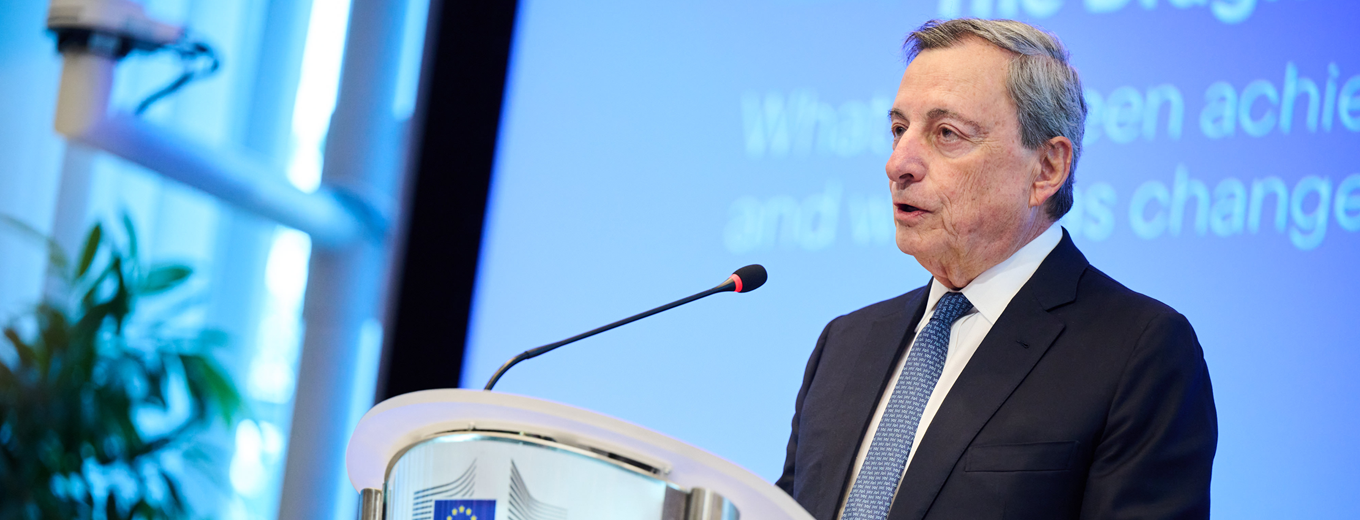From von der Leyen’s “science is one of the most valuable global goods” to Draghi’s “€175 billion for Horizon Europe will fall short”.
Even by Brussels standards, September was an exceptionally busy month. At SwissCore, we hosted various delegations and we celebrated our 30th anniversary with a week full of events and meetings, including a public conference and celebration to mark this milestone (see SwissCore article). Several of our sister offices also celebrated their anniversaries, including the Swedish, the Czech and the Estonian liaison offices for research, innovation, and education –congratulations to them all. September is also traditionally the month for the annual State of the European Union speech. And a week later, Mario Draghi delivered an address to mark the first year since the publication of his report on European Competitiveness. The two speeches struck a very different tone, and both emphasised the importance of research, innovation and education activities.
On 10 September 2025, Commission President Ursula von der Leyen gave her annual State of the European Union speech. One of the cornerstones of her address was the independence of the EU: She said that Europe could only compete in “today’s turbulent times” by investing heavily in competitive digital and clean technologies. She mentioned the proposal for a new European Competitiveness Fund and FP10 as elements to contribute to this goal. She also announced a new single market roadmap to 2028 that should address the still existing barriers in the single market, such as for example in the financial industry and in knowledge and innovation (the so-called fifth freedom, see SwissCore article). Another concrete element of her speech with relevance for innovation was the new Scaleup Europe Fund, aiming to make billions of euros available for scaling up start-ups in strategic technology sectors, such as quantum, AI and biotechnology.
On 16 September 2025, just one week later, former European Central Bank President Mario Draghi gave a speech marking one year since the presentation of his landmark report on the future of European competitiveness (see SwissCore article). While he welcomed the proposal for FP10, he considers it insufficient to significantly boost Europe’s competitiveness in strategic technologies. Following the European Commission’s assertion that 90% of their flagship initiatives were directly inspired by the Draghi report’s recommendations, Draghi himself assessed that the Commission’s actions “have not matched the ambitions” set out in his report. Finally, he concluded quite devastatingly that “Europe is in a harder place” than one year ago and that Europe’s inaction “threatens not only our competitiveness but our sovereignty itself”. He called for increased investment in innovation and reduced regulatory burdens for businesses, concretely proposing to radically simplify GDPR – the EU’s rules on data protection – and the AI Act.
The European Commission also held their annual Research and Innovation Days in Brussels, the biggest gathering for the sector with thousands of participants. The dozens of sessions covered topics ranging from science communication and dual use, to life sciences and scale-up support, to the automotive industry and the role of cities in combating climate change. While there were no major announcements, Commission President von der Leyen reiterated her ‘Choose Europe’ high-level strategy to “make Europe the global lighthouse for research and innovation”, by investing €500 million to attract and retain researchers in the EU. On that note, Research Commissioner Zaharieva stated that already this year there were already four times more applicants for ERC grants from abroad than in the previous years, and that applications for MSCA grants had reached an all-time high.
In conclusion, there is widespread support for investing more in research, innovation and education, as concretely shown by the Commission’s proposal to significantly increase the budgets for Horizon Europe and Erasmus+ in the next programme generation. However, many European countries are reducing their expenditures for education, research and innovation. And despite the efforts of the European Research Area (ERA) process, the European Higher Education Area and the Union of Skills initiative, fragmentation across Europe remains a challenge.

